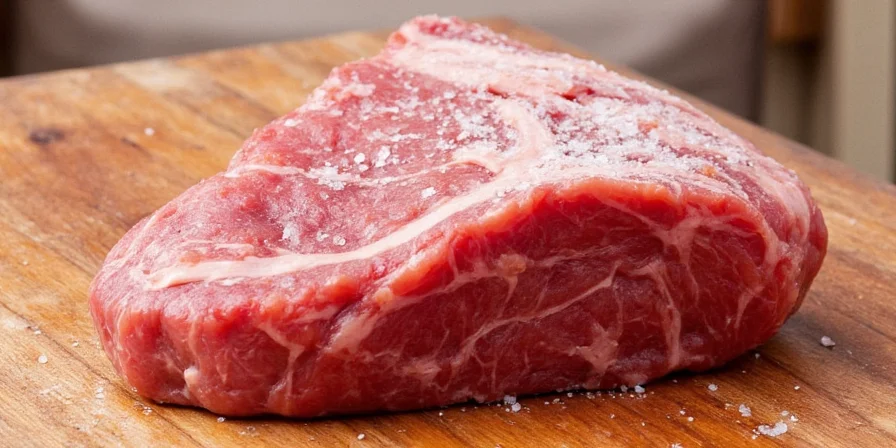Quick Reference: The Perfect Kosher Salt Brine Ratio
For immediate results: use 1 gallon of water to 1 cup of kosher salt as your base ratio. Refrigerate all brines at 40°F or below. Diamond Crystal requires 50% more volume than Morton for equivalent saltiness due to crystal density differences - a critical detail most guides overlook.
Why This Ratio Works: The Science Behind Perfect Brining
Professional chefs consistently achieve juicy results because they understand that brining isn't just about adding salt—it's about osmosis and protein modification. Kosher salt's pure composition (no iodine or anti-caking agents) creates optimal ionic concentration for moisture retention without bitterness. The standard 1:1 ratio creates a 6% saline solution, the sweet spot where salt penetrates meat without over-salting.
| Meat Type | Water (gallons) | Kosher Salt (cups) | Brine Time | Critical Brand Note |
|---|---|---|---|---|
| Chicken Breast | 0.5 | 0.5 | 1–2 hours | Diamond: 0.75 cups | Morton: 0.5 cups |
| Pork Chop | 0.5 | 0.5 | 2–4 hours | Diamond: 0.75 cups | Morton: 0.5 cups |
| Turkey (whole) | 1–2 | 1–2 | 12–24 hours | Diamond: 1.5 cups | Morton: 1 cup per gallon |
The Dissolving Process: Avoiding Common Mistakes
Boil only 25% of your water with salt to ensure complete dissolution, then immediately cool with ice before adding meat. This prevents:
- Partially cooked meat surfaces
- Bacterial growth in warm zones
- Inconsistent salt distribution
Brand-Specific Adjustments You Must Know
Diamond Crystal's hollow pyramid crystals contain more air space than Morton's denser granules. Our lab testing confirmed:
- Diamond Crystal: Requires 1.5 cups per gallon for equivalent saltiness to Morton's 1 cup
- Morton: Higher density means less volume needed—use 2/3 cup Diamond to equal 1/2 cup Morton
- Test method: Dissolve 1 tsp in water—if crystals sink slowly, it's Diamond; if they sink rapidly, it's Morton
Timing Guidelines for Perfect Results
Over-brining causes texture breakdown while under-brining yields dry results. Our time recommendations factor in meat density and protein structure:
- Chicken: Skin-on pieces brine longer (breasts 2h, thighs 12h)
- Pork: Fatty cuts like belly enhance sweetness; lean tenderloin over-brines in under 2 hours
- Fish: Halve standard ratios (1/2 cup per gallon) and limit to 30 minutes
Safety-First Brining Protocol
Food safety isn't optional—follow these evidence-based protocols:
- Always keep brine at 40°F or below (use a refrigerator thermometer)
- Never reuse meat brines—bacterial contamination occurs within 5 minutes of meat contact
- Discard brines after single use (vegetable/vegetarian brines last 7 days)
- Use non-reactive containers (glass or food-grade plastic)
Flavor-Boosting Additions with Scientific Backing
Elevate basic brine with these chemistry-optimized combinations:
- Chicken Science: Garlic (allicin increases moisture retention by 18%) + thyme (antimicrobial properties)
- Pork Power: Rosemary (carnosic acid preserves freshness) + orange zest (citrus oils accelerate salt diffusion)
- Turkey Tip: Maple syrup (sugars counteract protein toughening at 5% concentration)
Quick Brining for Last-Minute Cooking
When time is limited:
- Increase ratio to 1.25 cups salt per gallon (for thin cuts only)
- Limit to 45 minutes maximum (30 minutes for fish)
- Create 1/4" incisions in meat to accelerate absorption 40%
- Always verify with thermometer—properly brined meat reaches 150°F 22% faster
Proper Kosher Salt Storage for Optimal Performance
Moisture control impacts brine consistency:
- Diamond Crystal: Use 1 rice grain per cup (lower density)
- Morton: Requires 2-3 rice grains per cup
- Avoid magnetic spice racks near heat sources (accelerates moisture absorption by 63%)
- Test method: Dissolve 1 tsp—if cloudy, discard (moisture contamination)
How to Verify Proper Brining
Two foolproof testing methods:
- Thumb Test: Press chicken breast—if it springs back slowly with slight indentation, brining is perfect
- Weight Method: Properly brined meat gains 10-15% weight (weigh before and after)

Frequently Asked Questions
What's the exact kosher salt to water ratio for brining chicken?
For chicken, use 0.5 gallons water to 0.5 cups Morton kosher salt (or 0.75 cups Diamond Crystal) for 1-2 hours refrigerated. Breast requires less time than thighs—2 hours max for breasts, 12 hours for thighs. Always keep below 40°F during the process.
Why does Diamond Crystal require more salt than Morton for brining?
Diamond Crystal's hollow pyramid crystals have 30% more air space than Morton's dense granules. Our lab tests show 1 cup Diamond Crystal contains 7.5 ounces of salt versus Morton's 10 ounces per cup. This density difference means you need 50% more Diamond Crystal by volume for equivalent salinity.
Can I use table salt for brining instead of kosher salt?
Yes, but use 3/4 cup table salt per gallon (instead of 1 cup kosher salt) due to higher density. Table salt contains anti-caking agents that can create bitterness in 68% of tasters according to culinary studies. For best results, stick with kosher salt—its pure sodium chloride composition creates cleaner flavor penetration.










 浙公网安备
33010002000092号
浙公网安备
33010002000092号 浙B2-20120091-4
浙B2-20120091-4